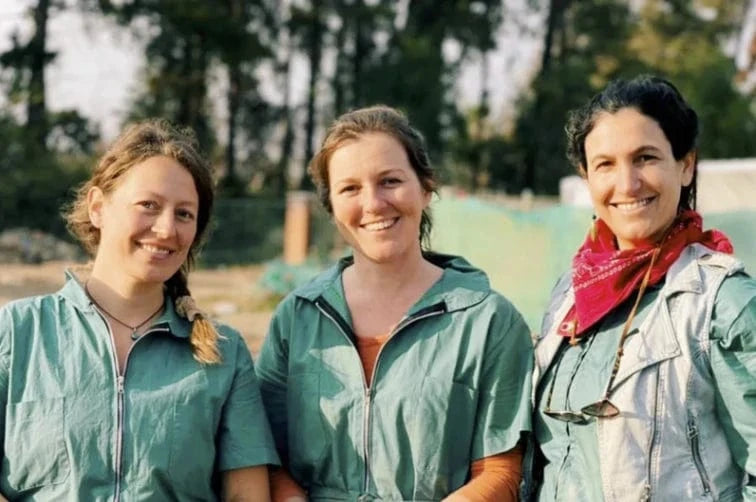Good News! 7 Positive Environmental Stories from July 2021

Get news, updates, & event Info delivered right to your inbox:
7 Good Environmental News Stories from the Past Month that will Make You Smile
What a summer it has been! Climate change ha s been at the forefront of every nature lover's mind this summer. With record breaking droughts, an earlier fire season, and massive floods around the world it can be very hard to focus on the good. If we don't focus on the good however, it can be difficult to continue forward in action. So clear your mind of all that rough stuff and come along with us on a journey of positivity with some GOOD NEWS!

EU Unveils Sweeping Climate Change Plan
This month, the European Union announced their plan to achieve carbon neutrality by 2050. The plan includes several bold proposals to parliament such as plans to tax jet fuel, ban the sale of petrol and diesel powered cars within 20 years. While by governmental and society standards this plan seems like it has intentions to make big impacts, environmentalists like Greta Thunberg are still pushing for more drastic change saying that unless the EU "tears up" its proposals, "the world will not stand a chance of staying below 1.5C of global heating". But hey, better to have a conversation moving and some sort of action taking place!

Goats Brought to NYC Park to Munch on Invasive Species
NYC Parks hosted their second annual "Running of the Goats" which is an event where animals are brought in to remove invasive species by grazing. Organizations that took part in the event have been focusing on the removal of invasive species like porcelain berry, English ivy, mugwort, multiflora rose and poison ivy. We know what you're thinking, "Isn't eating poison ivy bad for the goats?!". Nope! Goats are actually immune to the allergens in poison ivy. Their passion for eating and speedy grazing pace makes goats super invasive species removers!
Reforestation Projects: The July 2021 Update
Another month has flown by and you know what that means: another Reforestation Update that's chock-full of project stories, fun facts and tree puns to brighten your day! From Haiti and Minnesota to Mexico and California, tune in for some fresh-from-the-field updates courtesy of our awesome forest ambassadors Kyleigh and Nicole!

Biden to Restore Protections for Tongass National Forest in 'Critical Step' for Climate
A huge sigh of relief for Tongass National Forest arrived this month when President Biden and the Department of Agriculture announced that forest protections were put back in place after being rescinded three months before leaving office by former President Trump in a bid to open millions of acres to industrial logging. These protections will also reinstate the "Roadless Rule" which barres companies from construction and large-scale logging in more than half of the 16 million acre forest, which includes five million acres of old-growth trees such as Sitka spruce trees that date back at least 800 years. Congratulations Tongass National Forest!

One Tree Planted & SUGi Partnering to Plant 5 Urban Forests
We're thrilled to announce that One Tree Planted is partnering with SUGi to plant 15,000 trees of 185 native species across 4,700 square meters to create 5 urban forests around the world. Together, we're restoring a degraded temperate rainforest on the coast of Cornwall in the UK and rehabilitating a cattle farm as a sanctuary for native species in Queensland, Australia. Add to that the transformation of a de facto parking lot into a community hub in suburban Chile and the creation of a dense forest to shade suburban residents from southern France's intense summer heat, plus a new community forest on the site of a former landfill in Cambridge, Massachusetts. Each of these pockets of biodiversity has been carefully selected to maximize our collective impact.

Planting Extra Trees Will Boost Rainfall Across Europe
It's not always common knowledge that forests are a vital component to the water cycle! When it rains, trees absorb water through their roots, use a little for their own growth, and send the rest up their trunks to the branches and leaves. From there, the water is released as vapor from tiny stomata in the leaves. The water vapor floats up up and away, eventually condensing into clouds somewhere far away to create new rain. And the cycle repeats itself.
A new study found that converting agricultural land to forest would boost summer rains by 7.6% on average in Europe. These researchers also found that adding trees changed rainfall patterns far downwind of the new forests.

Orchid Thought to be Extinct Found on Top of Roof
You never know where nature will pop up! Serapis parviflora, also known as small-flowered tongue orchid was found in a rooftop garden in London atop the Japanese investment bank Nomura. This orchid is typically found in the Mediterranean basin and the Atlantic coast of France, Spain and Portugal and this is only the second time the species has been found in the UK.
It is unknown how the orchid found itself in this rooftop garden but the garden manager said, “Orchid seeds are incredibly small and can travel great distances by wind. The plants could have originated on the continent and been brought over the Channel on southerly winds which frequently bring Saharan dust deposits to the capital. Once settled on the Nomura roof the seeds would have formed a symbiosis with a mycorrhizal fungus enabling them to germinate and grow. While possible, the odds are astronomical.”
If you want to make sure your cup stays half full every month be sure too keep an eye out for our Reforestation Updates which occur on our YouTube channel the first Tuesday of every month! And of course we put out good news every month too but if you need it RIGHT NOW check out more good news from recent months to really ramp up the positivity!
Get news, updates, & event Info delivered right to your inbox:
Related Posts
Sustainable Diet Tips: How to Eat Healthy While Protecting the Planet
13/01/2026 by Meaghan Weeden
Agroforestry Explained: Principles, Benefits, and Case Studies
08/01/2026 by Meaghan Weeden
Plant Your Resolution: Making a Global Impact With The Grove
01/01/2026 by One Tree Planted
Popular On One Tree Planted
How to Reduce Waste: 21 Practical Zero Waste Tips for Everyday Living
23/12/2025 by Meaghan Weeden
Inspirational Quotes About Trees
16/12/2025 by Meaghan Weeden
The 9 Oldest, Tallest, and Biggest Trees in the World
11/12/2025 by One Tree Planted
Fundraising Disclosures

Be Part of the Restoration Movement
The Grove is more than just a monthly giving program: it's a vibrant community of individuals who are dedicated to reforestation and environmental restoration on a global scale.





